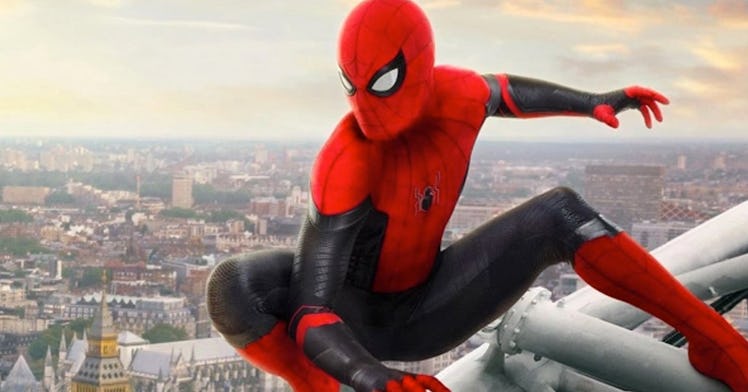Why Spider-Man Has Always Been the Best Superhero For Kids
He's not dark. He's not gritty. He's just Spidey.

Kids love Spider-Man. Your teenagers can’t wait to learn what secrets Spider-Man: No Way Home will reveal on Thursday, your preschooler binged Disney’s Spidey and His Amazing Friends–and everyone in your house is happy to rewatch Into the Spider-Verse, like, whenever. What’s up with that?
With all of our spider-senses tingling around the release of No Way Home, we wanted to delve a bit into just why your friendly neighborhood Spider-Man–and his widening family of spider-folk–has maintained his appeal among both younger kids and teenagers for nearly sixty years.
Spider-Man is a Kid…
First and foremost, Peter Parker is a kid when he becomes Spider-Man. In Stan Lee and Steve Ditko’s classic origin story in Amazing Fantasy #15, fifteen-year-old Peter Parker gets bitten by a radioactive spider. Suddenly, this awkward, socially struggling kid finds himself suddenly invested with superpowers. When I was an (awkward, socially-struggling) kid, I was drawn to Spider-Man because he was just like me. What if I’d been bitten instead of him? How would I use these powers? Would I make the same mistakes Peter does? Importantly, Peter isn’t Bruce Wayne or Tony Stark-rich–nor is he an alien god-figure, like Superman; even Marvel’s X-Men were born mutants, born different. Peter just happened to go to a museum exhibit and then POW! He has superpowers…just like I might one day have superpowers if I was, you know, in the right radioactive spider lab at the right time.
Recently, Marvel has creatively explored this kid/teenage aspect of Spidey. Even in the otherwise timeless (and rebooting) world of comics, Peter Parker’s Spider-Man has slowly grown up. In 2011, the creation of Miles Morales, a young African American Spider-man, provided younger readers with a whole new take on what it means to try to become a hero. Miles must navigate challenges of family, youth, and race that are new to Spider-Man’s character–but familiar to his twenty-first-century Black and Brown fans. In still another corner of the multiverse, a teenage Gwen Stacy (one of Peter’s flames from the original comics) becomes Spider-Woman (and then Spider-Gwen, and finally, in college, Ghost Spider)–launching her own popular storyline of a young woman wrestling with her own suite of challenges. With Into the Spider-Verse and Disney’s Spidey and his Amazing Friends, and twenty years of live-action films, kids of all ages continue to find versions of themselves in the adventures of Peter, Miles, and Gwen.
… and Spider-Man isn’t Perfect
In a 1996 interview, Spidey’s co-creator Stan Lee spoke to the other core attraction of the character: “He’s the one who’s most like me — nothing ever turns out 100 percent OK; he’s got a lot of problems, and he does things wrong, and I can relate to that.” Not only is Spider-Man a kid, but he’s a relatable, flawed kid. Lee actually got push back from his publisher when he initially pitched the character as “just a pimply high-school student.” According to Lee, his publisher responded “Don’t you understand what a hero is?” Lee, of course, did get it: both young and grown fans love seeing Peter wrestle with the same stuff that they do–and they like that he doesn’t always get it right, and must confront his mistakes.
At the heart of Peter Parker’s Spider-Man is his original failure to prevent the death of his Uncle Ben. After realizing his powers, Peter initially doesn’t go the hero route: instead, he uses them to win a wrestling match for cash money (like so many of us, cub-photographer Peter is also always struggling and hustling for cash); after the match, he refuses to help stop the police stop a thief because it’s not his affair. Of course, this same thief goes on to shoot dead Peter’s Uncle Ben a page later. It is this grief, this realization of his error, this understanding that “with great power comes great responsibility” that fuels Peter’s turn toward trying to be a hero. And, perhaps more importantly, throughout his sixty-year run, Peter (and the audience) is reminded what happens when he forgets this lesson: people get hurt. By allowing Peter to remain an imperfect character–always short on rent, a not-always-great nephew or friend or boyfriend, occasionally caught-up by attention or fame–kids have continued to find a relatable hero.
So, really, all Spider-Man stories anchor here: in how a normal young person tries to determine what to do with their powers, navigate the complexities of two lives (a kid and a crime-fighter), and tries to learn to become something more than just what the radioactive spider gave him. Peter–and now Miles and Gwen–must each learn how to not just be superpowered, but how to be an imperfect hero.